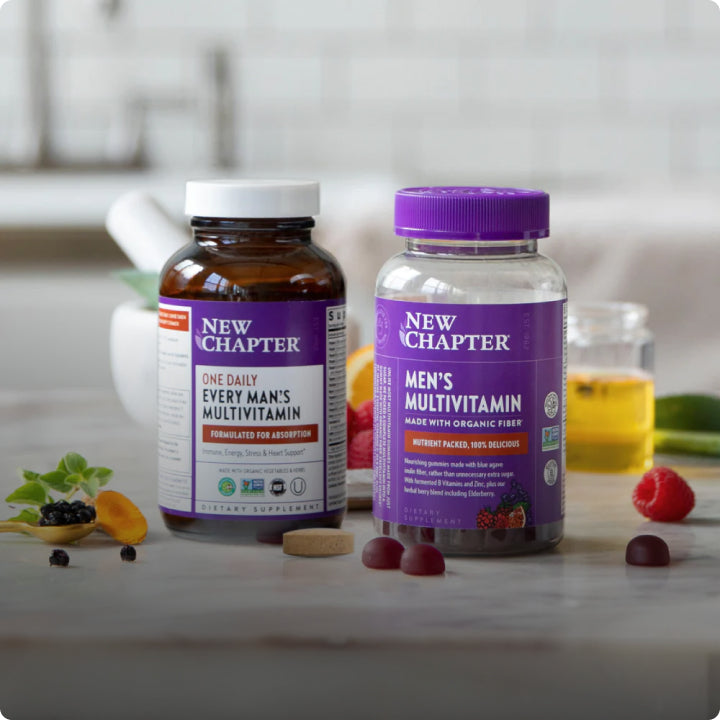You may have heard how Omega-3 fatty acids are important for wellness, especially heart health. You might also know that fish oil, particularly from cold-water fish like salmon, is an excellent way to get these good fats into your daily regimen. New Chapter® is super proud of our whole-food approach to fish oil—crafted with Wild Alaskan Salmon that is sourced with integrity and packed with 17 Omegas.
But the truth is, fish don’t produce their own Omega-3s! They actually get Omega-3s from their food, starting at the bottom of the food chain with sources like microalgae. Today, we’re diving in to all things algae, including how they are naturally concentrated, 100% vegan Omega-3 sources.
What are Omega-3 Fatty Acids?
Omega-3 fatty acids are a type of polyunsaturated fatty acid. Sometimes called just Omega-3s or Omega-3 fats, these are healthy, essential fats that the body needs to function. They support cardiovascular (heart) health, as well as eye, brain, and joint health.* While your body naturally produces many healthy fats, it does not produce adequate amounts of Omega-3s. Omega-3 fatty acids are important because they support the function of cells and other processes in the body. These functions include making hormones that regulate blood clotting, contraction and relaxation of artery walls, and inflammation response.

Where Do Omega-3s Typically Come From?
Because your body doesn’t make them, you get the Omega-3s you need from your diet! There are three main types of beneficial Omega-3, and they come from different sources. For example, EPA (eicosapentaenoic acid) and DHA (docosahexaenoic acid) are common Omega-3s that come from fish. If you regularly take a fish oil supplement, these are the healthy fatty acids you’re getting. On the other hand, ALA (alpha-linolenic acid) is found in nuts, flaxseeds, vegetable oils, and leafy greens.
Vegan Foods High in Omega-3s
If you avoid animal products, it’s a great idea to seek out Omega-3 vegan sources of heart-healthy DHA and EPA. However, most plant sources of Omega-3s deliver ALA rather than DHA and EPA. Your body uses ALA for energy, and can convert some to EPA and DHA. Here are some common foods that provide dietary ALA.

Flaxseed
According to a study published by the Canadian Journal of Cardiology, flaxseed is one of the richest plant-based sources of the Omega-3 ALA. As a vegan alternative to fish oil, this is one of your best choices! In fact, one tablespoon of flaxseed contains around 2.4 grams of this essential Omega-3 fatty acid. Flaxseed is a versatile ingredient that can be added to almost any recipe. It's easy to incorporate into your everyday diet!

Chia Seeds
Chia seeds are popular in the health-food community today for good reason. Chia seeds are packed with beneficial nutrients such as fiber, protein, calcium, and zinc. However, one of the health benefits that is gaining attention today is the high Omega-3 concentration of chia seeds. According to Harvard School of Public Health, sixty percent of the oils in chia seeds come from ALA. You can add these versatile seeds to your favorite recipes, from chia seed pudding to chia seed banana bread.

Beans
Beans, beans they’re good for your heart… and it’s because of the Omega-3s! According to the Physicians Committee for Responsible Medicine, half a cup of beans contains approximately 0.1 grams of ALA. If you’re consuming beans as a source of Omega-3s, look for varieties that are particularly high in ALA such as soybeans, kidney beans, and navy beans.

Walnuts
Many varieties of nuts naturally contain ALA, especially walnuts. Walnuts have been considered a superfood in the health-food community for years because of their concentration of beneficial fats. A study reported by Harvard Health finds that regularly consuming walnuts can potentially lower your cholesterol and improve heart health.

Edamame
Because edamame is a soy product, it is rich in critical Omega-3 fatty acids. Soy is a common replacement for many proteins in the vegan diet and is high in ALA. So reaching for edamame as a vegan alternative to fish oil is a popular choice!
Are Fish Oil Supplements Vegan?
The type of Omegas in fish are critical to your health and well-being. However, because fish oil is an animal product, fish oil supplements are not considered vegan. Fortunately, many vegan fish oil alternatives and vegan DHA supplements are available on the market today.
Where Do Vegan Omega-3 Supplements Come From?
We’ve covered vegan foods that provide ALA Omega-3 fatty acids. But what if you want to go directly to vegan DHA and EPA? Remember, DHA and EPA are those Omega-3 fatty acids that make fish oil supplements an essential part of many people’s wellness routines. While famous for their Omega-3 content, fish, like humans, don’t naturally produce Omega-3 fatty acids. These key Omegas come from the single-cell plant link in the marine food chain: microalgae. Some forms of microalgae naturally produce high levels of these beneficial fats. So you can go straight to the plant source and give fish a break with vegan microalgae oil, the original Omegas.
New Chapter’s Algae Harvesting Process
New Chapter’s Vegan Omega-3 Complex supplement is crafted with plant-based Omega fatty acids, including all-important DHA and EPA, that are extracted from fermented microalgae grown in a clean environment in the USA. The nutritious single-cell plants are cultivated in a rich broth that is then filtered in a solvent-free process to extract pure algal oil brimming with good fats. Using a closed, indoor system means the algae are fully traceable throughout their lifespan. The result? Excellent quality Omega-3s designed for your body to really absorb.

Are Vegan Omega-3s as Effective as Fish Oil Supplements?
The effectiveness of Omegas depends on the type of Omega-fatty acid and the amount. So for example, 100 mg of vegan DHA from algae would be considered as effective as 100 mg of DHA from fish. However, because microalgae is the original source of sea-sourced Omegas, it tends to be more concentrated than fish. One softgel of vegan DHA & EPA can really pack in more good fats compared to one softgel of fish oil.
Choosing the Right Omega-3s
There are many Omega-3 options on the market today. How do you choose the best vegan Omega-3 or Omega-3 fish oil for you? Well, we think the answer is easy: choose the high-quality option! New Chapter is proud to offer a family of Omega-3 products for vegans and non-vegans alike, and ALL of our Omegas are made with tested and trusted ingredients. (Always consult with your healthcare professional before adding a supplement to your regimen.)
Our Wholemega™ Fish Oil and Wholemega™ for Moms are made with pure, 100% wild-caught Alaskan salmon oil. Because we are dedicated to offering a whole-food alternative to fractionated, high-heat purified fish oils, we use a gentle extra-virgin process that involves no bleaching or chemical isolation. Plus, we use upcycled trim from salmon already caught and filleted for restaurants and fine retail stores, which helps to avoid food waste.
Our vegan Omega-3s are rigorously tested just like our fish oil products. The fermented microalgae used to craft our Vegan Omega-3 supplement (Schizochytrium sp.) are meticulously cultivated in a clean, indoor environment.






